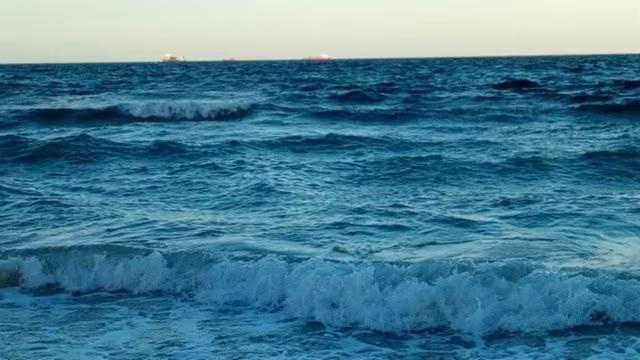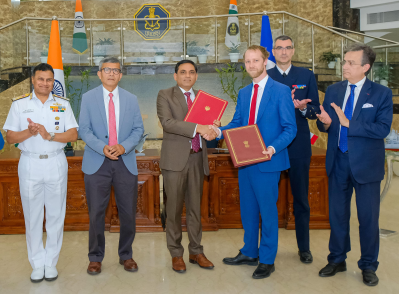
Third UN Ocean Conference: Opportunity to build consensus
Ambassador Thierry Mathou’s opinion piece in The Indian Express.
In the context of ever-faster climate change and overexploitation of marine resources, the ocean is not just an issue like any other: It is everyone’s business.
The Indian peninsula is surrounded by an ocean, with about a third of India’s population living in coastal areas. With 7,517 km of coastline, India is among the countries whose daily life, economy and environment are most impacted by the ocean. This is acknowledged in the Indian government’s Vision 2030, which recognises the blue economy as one of the 10 core dimensions of growth.
The ocean is a global commons — it belongs to all of us. It feeds and protects our peoples. It makes us dream and travel. It provides us with sustainable energy, the means to trade, resources, and infinite scientific knowledge.
One in three people relies on the ocean for their livelihood, yet it is in danger. It is an area that is still largely unknown, and lacks both the global governance and the funding necessary for its preservation. The figures are worrying: More than eight million tons of plastic end up in the ocean every year, according to a study published in Science. More than a third of fish stocks suffer overfishing, while ocean acidification, rising sea levels, and the destruction of marine ecosystems gain pace as direct consequences of climate change.
We must act now. More than ever before, we must make sure that multilateral action is commensurate with the challenges of ocean protection.
From June 9-13, France will co-host the third United Nations Ocean Conference (UNOC3) with Costa-Rica. Around 100 heads of state and government, as well as tens of thousands of researchers, scientists, economic actors, activists and citizens from around the world, will converge in Nice. Our aim must be clear: Protecting the ocean through tangible action.
Ten years after COP21 and the Paris Agreement, which established a binding global framework to limit climate change, the UNOC3 is a historic opportunity. The “Nice Ocean Agreements” can form an international pact for the conservation and sustainable use of the ocean, fully in line with the Sustainable Development Goals adopted by the UN in 2015. To this end, the talks in Nice need to be operational and action-focused, aiming for better governance, further financing, and greater knowledge of the seas.
When it comes to governance, the Agreement on Marine Biodiversity of Areas beyond National Jurisdiction (BBNJ Agreement), under the UN Convention, is crucial.
The high seas, which represent more than 60 per cent of the ocean, are currently the only areas not governed by international law. The lack of surveillance and common rules is causing a real social and environmental disaster, with massive hydrocarbon and plastic pollution, illegal, unreported and unregulated fishing, and the capture of protected and endangered mammals. To end this legal vacuum, we need the BBNJ Agreement to be ratified by 60 countries, so that it may come into force.
The protection of the ocean also requires public and private financing, and support for a sustainable blue economy. To continue enjoying the incredible economic opportunities offered by the ocean, we need to make sure marine resources can regenerate. In Nice, several commitments will be announced for global trade, shipping, tourism and investment.
Lastly, how can we protect something that we do not — or insufficiently — know? We need to enhance our knowledge of the ocean and disseminate it more effectively. Today, we are capable of mapping the surface of the Moon and Mars, but the depths of the ocean — which covers 70 per cent of the Earth’s surface — remain unknown. Together, we need to mobilise science, innovation, and education to better understand the ocean and raise public awareness.
To prepare for the UNOC3 milestone nationally and to reflect on India’s visions, France will be organising a Festival of Ideas, aptly named “Not in my ocean”. Throughout May, Alliances Françaises in Delhi, Chennai, Puducherry and the Museum of Goa will host immersive exhibitions, film screenings, workshops, discussions and debates with experts and artists from France and India. The public will be invited to share their views, learn, admire, and discuss vital topics concerning the ocean. Further, along with the Ministry of Earth Sciences and the Embassy of Costa Rica, we will hold “Blue Talks” in Delhi, bringing together Indian institutions and researchers to provide clear recommendations from India for this UN Conference.
In the context of ever-faster climate change and overexploitation of marine resources, the ocean is not just an issue like any other: It is everyone’s business. In a context in which multilateralism is being challenged, we must not forget our shared responsibility. The ocean is a universal bond, and crucial for our future. Together, we can make UNOC3 a watershed for our peoples, for future generations, and for our planet.
The writer is Ambassador of France to India
The opinion piece was published in The Indian Express on 28th April 2025.










Aucun commentaire
Vous devez être connecté pour laisser un commentaire. Connectez-vous.